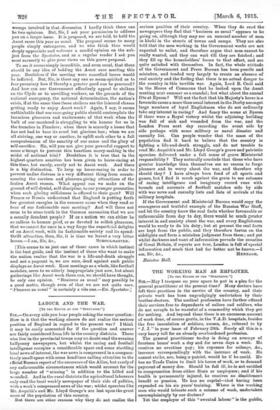LABOUR AND THE WAR.
[To ens Enrroa He THE ‘. Sracrvroe."1.1
EIS.,--011every-side you hear people asking the same question How is it that the working .classes .do not realize the serious position of England in regard to the present war ? Mink it may he easily accounted for if the question and answer are fairly considered from life in the country districts. Those who live in the provincial towns may no sloubt read the evening halfpenny newspapers, but whilst the racing and football intelligence occupies a considerable space and some startling local news of interest, the war news is compressed in a compara- tively small space with some headlines calling attention to the cffieisiBurean reportof the successes of the Allies, but rarelyof any unfavourable circumstances which would account for the large number of " missing " in addition to the killed and wounded. And in the rural districts the agricultural labourers only read the local weekly newspaper of their side of politics, with a week's compressed news of the war; whilst speeches like Mr. Asquith's and Mr. Lloyd George's are last upon the great mass of the population of this country.
Mut :there are other reasons -wiry they slo mot realize the
serious position of their country. When they do read the newspapers they find that "business as usual" appears to ibe going on, although they may see an unusual number of men in khaki in the streets of towns and camps. They are also told that the men working in the Government works are not expected to -enlist, and therefore argue that men canna her really wanted, and they can wait till they are fetched ; and they fill up the householders' forms to that effect, and are quite satisfied with themselves. In fad, the whole attitude of the Government and Press Bureau has been puerile and -mistaken, -and tended very -largely to create an absence 'of real anxiety and the feeling that there is110 actual danger to the country in this terrible -war. Again, Lord It. °edit said in the House of Commons that he looked upon the Ascot meeting next summer as a scandal; but what about the annual Me at Epsom.? Will not the fact that his Majority's horse is a favourite cause a more than moral interest in the Derby amongst large numbers of loyal Englishmen who do not ordinarily take any interest in racing ? And fancy the scene at Epsom if there were a Royal victory whilst the adjoining building waa full of sick and wounded from the war, and the London Press next day recording the event aide by side perhaps with some military or naval disaster and casualty list. Can people wonder that the mass sif the population find it hard to believe that the country is fighting a life-and-death struggle, and do ncit trouble to read Mr. Asquith's and Mr. Lloyd George's grave and patriotic speeches delivered, under a full sense -of grave Ministerial responsibility ? They naturally conclude that those who have greater knowledge than -themselves see no reason to forgo pleasure and to worry about the war, and therefore why should they? I have always been fond of all sports and games, but I find it much against the grain to see -columns of racing intelligence end imaginary record runs with hounds and accounts of football matches side by side with war news and casualty lists and lists of arrivals at the military hospitals.
If the Government send Ministerial Bureau would copy the courageous and truthful example of the Russian War Staff, and let the country know the real facts whether favourable or mrfavomable from day to day, there would be much greater interest in and anxiety about the war, and every Englishman would be ready to do his duty ; but at present the real facts are kept from the public, and they therefore fasten on the sidelights and form a mistaken judgment from them-; and yet whilst darkness and want of information pervade the counties of Great Britain, if reports are true, London is fall of special information and much that had far better not be known.—I










































 Previous page
Previous page